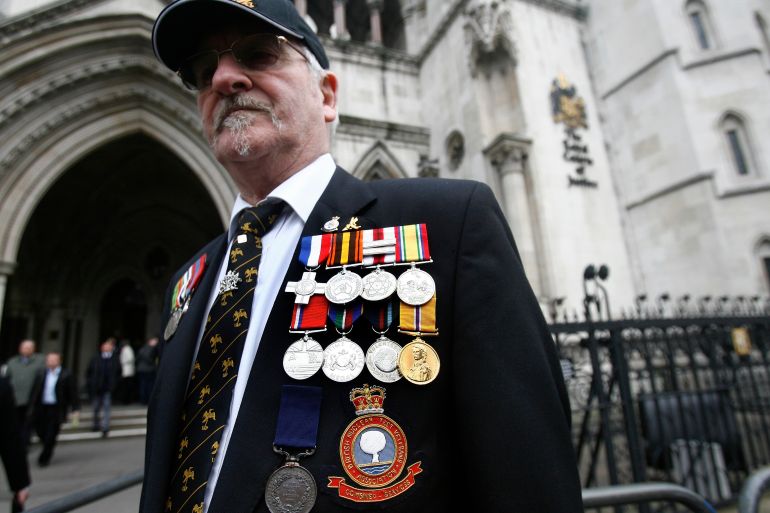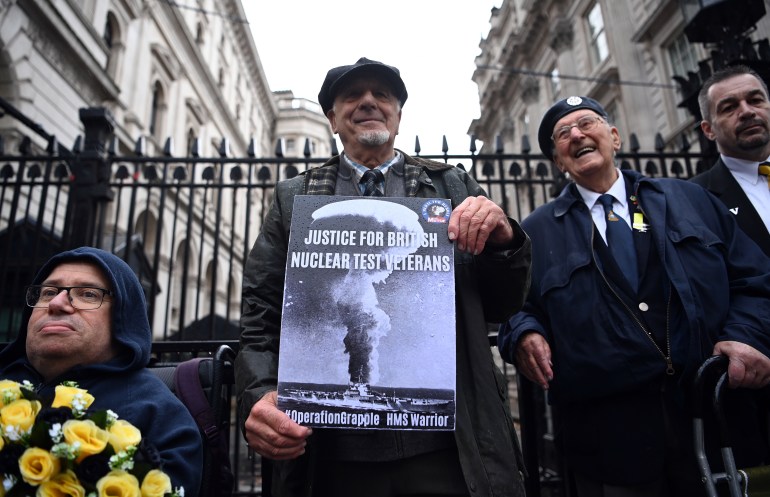UK recognises veterans of nuclear weapons tests with medals
The honour comes 70 years after Britain detonated a nuclear bomb in the Indian Ocean.

Seventy years after Britain detonated a nuclear bomb in the Indian Ocean, troops who took part – sometimes unknowingly – in the country’s atomic weapons tests are being recognised with a medal.
The UK government’s announcement on Monday of the Nuclear Test Medal is a victory for veterans and their families, who have campaigned for years for recognition.
Keep reading
list of 1 itemNow, many want recognition of the health problems they believe they suffered as a result of exposure to radiation.
Prime Minister Rishi Sunak said the medal was “an enduring symbol of our country’s gratitude” to the test veterans.
“Their commitment and service has preserved peace for the past 70 years, and it is only right their contribution to our safety, freedom and way of life is appropriately recognised with this honour,” he said.
Sunak attended the first-ever ceremony for the nuclear veterans at the National Memorial Arboretum in central England, marking the 70th anniversary of the United Kingdom’s first atmospheric atomic test on October 3, 1952.
Operation Hurricane
The detonation of a plutonium implosion device aboard a Royal Navy ship in the Montebello Islands off Western Australia, dubbed Operation Hurricane, made Britain the world’s third nuclear-armed nation, after the United States and Russia.
Defence Secretary Ben Wallace said those who took part had made an “invaluable contribution to the safety and security of the UK”.

The UK set off further nuclear explosions in Australia and ocean territories, including on Christmas Island, over the following years.
Veterans groups say about 22,000 UK military personnel were involved in British and American tests in the 1950s and 60s, many of them conscripts doing postwar national service.
Veterans, scientists and civil servants from Australia, New Zealand, Fiji and Kiribati who served under British command during the tests between 1952 and 1967 will also be eligible for the UK medal.
Many veterans and their families are convinced there is a link between the tests and health problems they have suffered, and are pressing the UK to hold a public inquiry into the tests.
Some allege they were deliberately exposed to radiation to see how their bodies would react, and claim their medical records were later suppressed.
‘The end of the world’
John Morris, who saw nuclear blasts on Christmas Island as a young conscript in the 1950s, told the BBC earlier this year that “I felt like I had seen the end of the world.”
“I saw right through my hands as the light was so intense,” he said. “It felt like my blood was boiling. The palm trees – which had been 20 miles [32km] away – were scorched.”
Numerous studies over the decades have probed allegations of high cancer rates among the test veterans, and of birth defects in their children, but have failed to establish an ironclad connection with the nuclear tests.
Successive British governments have denied troops were exposed to unsafe levels of radiation.
Alan Owen, founder of the Labrats International charity for atomic test survivors, welcomed the government’s recognition, but said “we want more”.
“It’s great the government is starting to recognise the veterans,” said Owen, whose father James was present during nuclear testing on Christmas Island in 1962. James Owen died in 1994, aged 52.
“For me, it is going to be an emotional day because I will be representing him and my sister will be there and we will be laying flowers in his memory.”